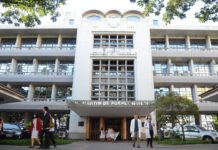BANKED on as the country’s “smartest investment yet,” three students who are set to graduate at the top of their classes, were awarded the 2006 Bank of the Philippine Islands – Department of Science and Technology (BPI-DOST) Science Awards last Feb.3 at the Thomas Aquinas Research Complex.
Allergy anew
Biology senior Criselda Nuevo has long wanted to be like her parents, both doctors. She dreams of becoming an anesthesiologist.
Fascinated with both molecular biology and biotechnology, she applied to be a research assistant of Dr. John Donnie Ramos, a multi-awarded researcher from the College of Science conducting house dust mite allergy research. After passing the screening, she and her thesis-mates pursued their paper, “Recombinant blo t 5 allergen expression and IgE reactivity among Filipino allergic patients.”
The group produced a purified version of allergens in crude extract form, to which most Filipinos are sensitive. According to Nuevo, allergen in crude extract form refers to allergens which are indistinguishable compared to unknown proteins and other allergens. The purified version was then utilized for diagnosis of allergies.
But Nuevo said she would have been happier if the people who also took part in completing the study were recognized.
“May mga pumapansin pala sa mga katulad namin na undergraduates,” Nuevo said during the awarding ceremonies. “Hindi nasasayang ‘yung pagod (namin).”
Nuevo hopes that anesthesiology and molecular biology in UST would bloom and intersect like in other countries. “Hopefully I can study abroad so I can introduce it here,” Nuevo told the Varsitarian.
A self-confessed nerd
A bookworm, a nerd and a food enthusiast was how Jasper Lim, a senior Mathematics student, and one of the recipients of this year’s BPI-DOST Science Awards, described himself.
Immersed in Math books since he was a child, Lim developed the penchant and curiosity for discovering more about the wonderful facets of the subject.
“I started to appreciate Math when I was in (kindergarten). As early as then, I was fascinated with Math books,” Lim said. “I wanted to have a deeper understanding of the subject so I motivated myself to study more.”
For his thesis, Lim studied the risks and costs of receiving OFW remittances in the country. He and his thesis partners developed a mathematical formula that can lower the charges of sending remittances in the country to up to 30 per cent. However, with banks withholding certain data for privacy issues, Lim said the study have assumptions that still need to be verified. He said if they are able to gather enough data to prove the assumptions then the formula could be used to ease the transfer of remittances.
After graduation Lim intends to work at BPI, but he is also looking into the possibility of teaching Mathematics at the University in the future.
Java man
For fifth-year chemical engineering student Jennifer Balog, the lack of low-cost alternatives for treatment of heavy metal contamination in water drove her to write their paper “Pressure drop correlation for java moss (Vesicularia dubyana) as packing material for biosorption column operation.”
Continuing the research of Christian Benedicto, one of last year’s BPI-DOST Science and Technology awardees, Balog determined the parameters needed for the design of a column where biosorption, or the removal of heavy metals from waste water, will be possible. Biosorption offers a useful alternative to the conventional system of wastewater treatment because it gives competitive metal recovery without sludge generation in water treatment at lower costs.
According to Balog, it has been proven that java moss, a plant found mostly in the coastal areas of Quezon and Bicol, is an effective and cheaper biosorbent for waste treatment.
However, for large-scale applications as in modern industries, it is important to have a direct or continuous process, which their study aims to develop by determining the pressure drop correlation, a mathematical formula needed for the design of the column that will contain the process.
The pressure drop determines the energy requirement of pumps and compressors to be used in industries.
“What we had was a mini-apparatus that will serve as the scale or model for industrial applications,” Balog told the Varsitarian. “What we wanted was a pressure correlation equation specifically for java moss.”
After graduation, Balog plans to work in company lines related to her courses. She also intends to pursue graduate studies in environmental engineering here or abroad.
Since the award’s inception in 1989, the BPI-DOST Science Awards have been inspiring young scientists to take their creative and relevant sci-tech ideas into higher levels. And for this year’s Thomasian recipients, the award gives them more pressure to do what others expect of them. But then like any typical researcher, they all hope to see their studies realized in actual applications.
















